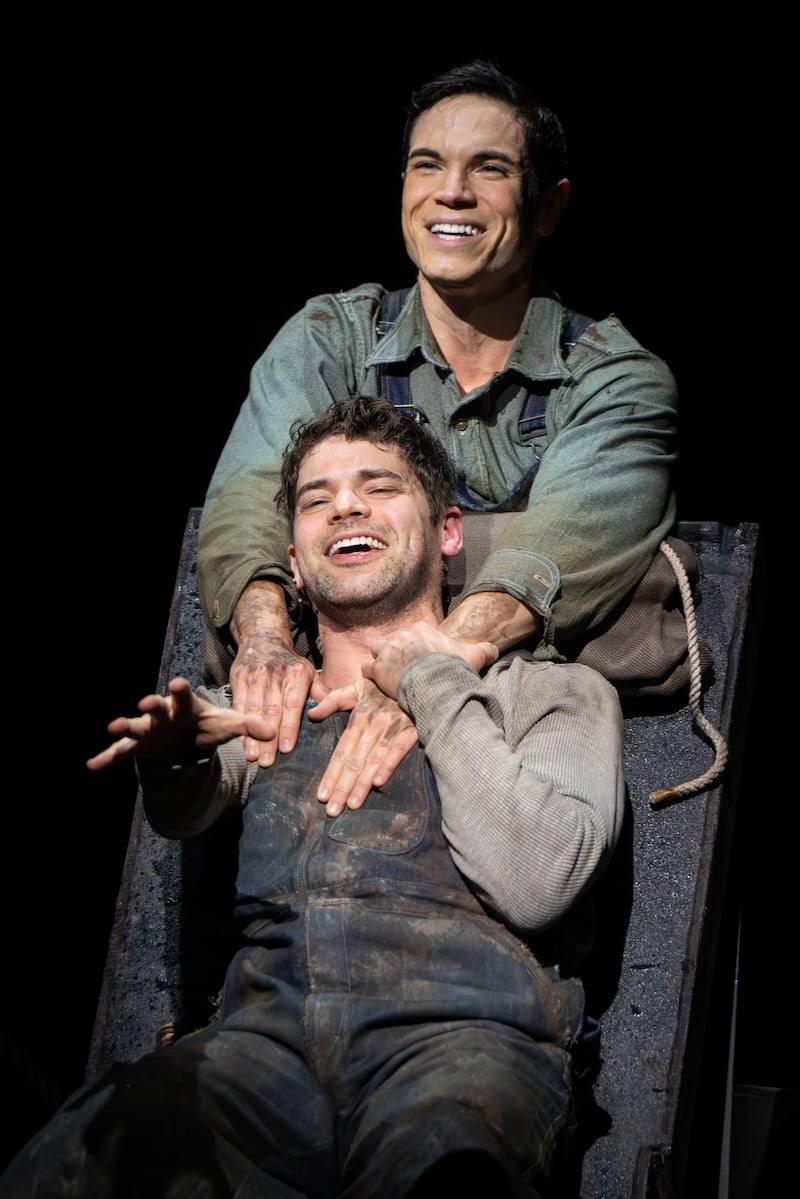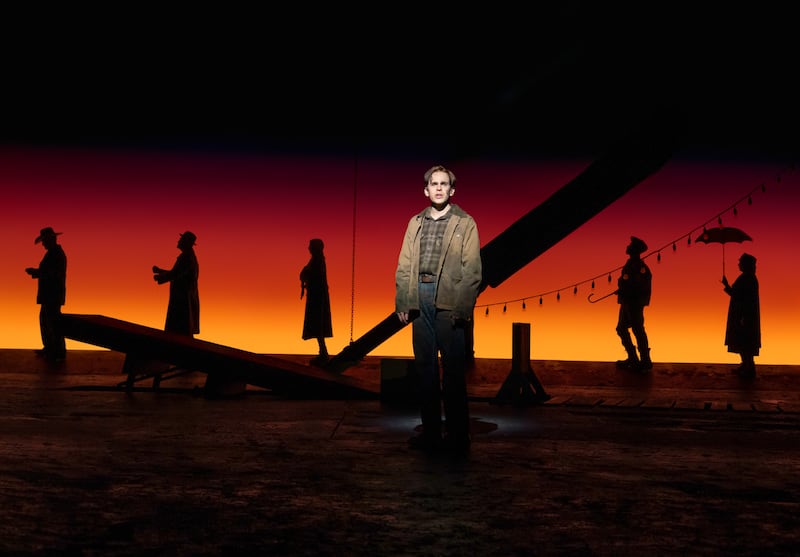The story of Floyd Collins (Lincoln Center Theater at the Vivian Beaumont, booking to June 22) is a true one. In January 1925, a cave explorer named Floyd Collins became trapped underground in a Kentucky cave, buried in debris, his left leg pinned by a boulder.
Collins’ attempted rescue became a much-reported media sensation—the site of the incident even a tourist destination—but all efforts to variously winch and dig him out failed. Collins died almost two weeks after becoming trapped—a desperate, gruesome death caused by a combination of thirst, hunger, and hypothermia.
So, cheery raw material for director Tina Landau (who also wrote the book) and Adam Guettel (music and lyrics, additional lyrics by Landau) to craft into a musical. It was first performed off-Broadway in 1996, and is now at Lincoln Center receiving its Broadway debut performance almost 30 years later.
The first challenge—on the appositely cavernous Vivian Beaumont stage—is how to conceptualize Collins’ (Jeremy Jordan) plight. Here, the sets by dots, lighting by Scott Zielinski, projections by Ruey Horng Sun, and sound—notably adept by Dan Moses Schreiber, especially when it comes to the recurring use of Collins’ echoing chants—emerge as the standout stars of the show.

Landau, who also directed Redwood starring Idina Menzel—and was Tony-nominated for her helming of the magnificent Spongebob Squarepants—maintains a mostly uncluttered stage. In a stunning opening scene we observe Collins’ descent underground via contrasts of the grainy muck of the stage, contrasts of light and dark, rising and descending plinths appearing out of the gloam, and Jordan’s tricksy gymnastics.
As the performance progresses, the stage acquires some adornment—mechanical aids and such—but what remains constant is Collins’ entrapment. For this, Jordan reclines on a dark lounger, a curious choice, because reclining on a lounger doesn’t immediately convey life-imperiling entrapment underground. However, various dramatic rescue attempts—one including attempting to drag him out, causing more physical pain—are enough to make you wince.

Guettel’s score is a complex, melodically discordant mix of folk and bluegrass. Jordan and the rest of the cast sing excellently, but no one song imprints itself, apart from those sung by Jordan and an excellent Jason Gotay playing his brother Homer.
In real life, Homer managed to reach his brother to convey food and some drink, and the brothers’ duets have an intensity to match the circumstances they find themselves in.

Adding to the slightly White Lotus-y vibe, Floyd’s relationship with his sister Nellie (Lizzy McAlpine) is played as so close and intimate, you have to remind yourself they are meant to be siblings rather than more romantically inclined partners. Homer must decide whether to take advantage of all the public attention around his brother’s situation by becoming a celebrity himself.
As a local reporter, Taylor Trensch crafts a genuinely quirky character—buzzy, annoying, endearing—who tries to balance being both reporter and volunteer rescuer. Sean Allan Krill plays the Big Rich Guy who has the means to help, but spends most of his time bellyaching at everyone.

While the big question—can they get Floyd out?—is restated with the introduction of every ultimately futile method to do so, the musical mounts some energy-filled set-pieces to lift the gloom, such as the area around the site becoming a razzle-dazzle destination for rubberneckers; colorfully crazy stage transformation features balloons and all the trappings of a small-town carnival. Jordan rises from the lounger occasionally in dream sequences imagining a life away from the hell he is in. A trio of journalists, cameras around their necks, deliver a jaunty song-and-dance number.
The effects of the drama on Collins’ family are sketched, but not fully or convincingly enough. A musically underused Marc Kudisch plays Floyd’s father, Jessica Molaskey his mother—both in repetitive, hand-clenching, grizzling, fretting mode.
Floyd Collins is more meditative than propulsive, with an unhappy ending it doesn’t shy from. You feel for its main character, but Collins is also a strangely meek and receding focus in his own story. Simultaneously, both his plight and the show disappear from view.
The post ‘Floyd Collins’ Review: Musical About Man Trapped in a Cave for 14 Days appeared first on The Daily Beast.




